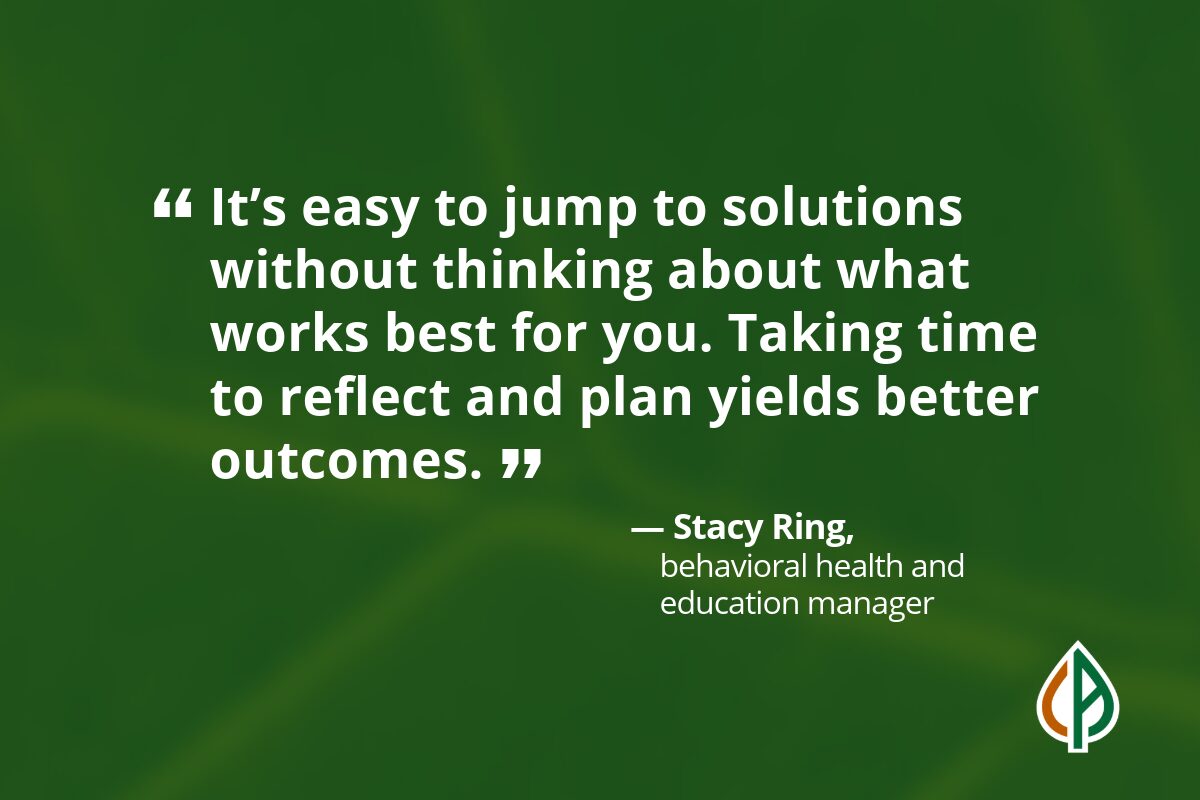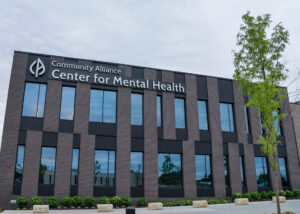How to set new year goals with grace

As we turn the page to a new year, it’s easy to feel the pressure to make resolutions. But what if we instead gave ourselves the space and time to pause, reflect and honor our personal journeys? Stacy Ring, Community Alliance’s behavioral health and education manager, shares how to make our improvement goals more effective, positive and meaningful.
The benefits and drawbacks of new year’s resolutions
Resolutions can motivate and inspire us to take action. But they can also set us up for disappointment. When we’re overly ambitious or vague in our goals, or when life’s inevitable obstacles arise, we can feel like we’ve failed.
This sense of falling short can chip away at our confidence, making us hesitant to set goals in the future. Research shows that most people abandon their resolutions after a few months, and older age groups are less likely to set them.
This isn’t to say resolutions are bad, but your goals deserve an intentional, thoughtful approach. That way, when you do act on them, you’ll have a clearer path and a more grounded sense of purpose.
“It’s easy to jump to solutions without thinking about what works best for you,” said Stacy. “If someone wants to be more active, they may quickly sign up for a gym membership. But they don’t take the time to think about which gym is right for them — or even if a gym is the best way to achieve this goal. Taking time to reflect and plan yields better outcomes.”
Setting SMART goals
To set yourself up for success, consider the SMART goal framework:
- Specific: Define exactly what you want to achieve.
- Measurable: Determine how you’ll track your progress.
- Attainable: Make sure your goal is realistic.
- Relevant: Align your goal with your values and priorities.
- Time-specific: Set a deadline or timeframe.
Let’s add another layer to SMART goals: identity-based goals. Instead of focusing solely on outcomes (“I want to run a half marathon”), think about who you want to become (“I want to be a more active person”). This shifts your focus from achieving a specific result to adopting habits and mindsets that align with your desired identity. Small, consistent actions, like packing a gym bag the night before or drinking more water, build momentum and lead to lasting change.
Practicing grace on your personal improvement journey
The road to any goal is rarely linear. There will be setbacks, changes and moments of doubt, but these are all part of making progress.
Here’s how to practice grace and resilience on your journey:
- Learn from setbacks: Every misstep is a lesson. Reflect on what didn’t work and why. Was it the timing? The plan? Use this information to refine your approach.
- Celebrate small wins: Keep track of the victories, no matter how small. Whether it’s a star on your calendar for gym attendance or a colorful post-it for every mindful decision, visually marking your progress can be very motivating.
- Reframe failures: View setbacks as steps toward success. Shift your mindset from “I failed” to “I found another way that doesn’t work.”
- Cultivate self-compassion: Pay attention to your self-talk. When you’re tempted to be harsh, name the thought, claim it, tame it and reframe it. Replace “I’m not good enough” with “I’m learning and growing.”
- Focus on daily presence: Gratitude and mindfulness anchor you in the present moment. Check in with yourself daily. Savor the actions you’ve taken today that align with your goals and appreciate the progress you’ve made, however small.
For those navigating recovery, these principles are especially powerful. Recovery is about stringing together small victories, like getting out of bed, taking a walk or reaching out for support. By focusing on daily habits and realistic, identity-based goals, you can build a foundation of resilience.
Changing habits often means shifting how we think. Try practicing “practical optimism” to establish grounded, realistic hope for change. Instead of toxic positivity (“Everything will be fine”), practical optimism asks: “What realistic steps can I take to improve my situation today?”
The new year isn’t a finish line or a test of willpower. It’s an opportunity to reflect and grow at your own pace. Give yourself the gift of grace, allow for imperfection and celebrate your progress.
“There are many hard things we’ve already accomplished in our lives,” said Stacy. “Your brain will automatically register the things you fell short on, so check in with yourself often and keep track of the things that went right along the way.”



